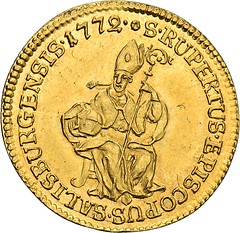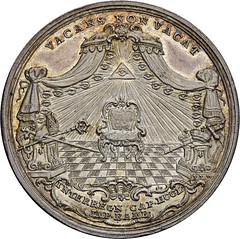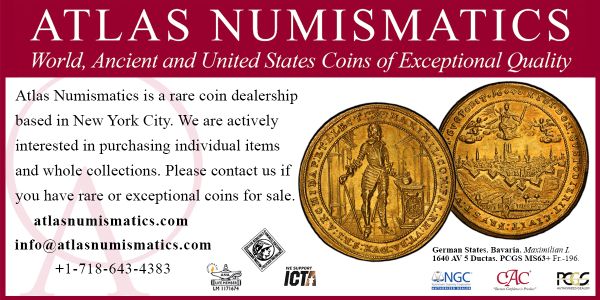
PREV ARTICLE
NEXT ARTICLE
FULL ISSUE
PREV FULL ISSUE
KUENKER AUCTION SALE 426On 7 and 8 July 2025, Künker will auction off about 900 lots of European coins and medals. The focus is on the Habsburg Empire and Germany, and there is a particularly large number of issues from Bavaria, Brandenburg-Prussia, Münster, Saxony and the German Empire. Lovers of medals will also find a rich selection. Moreover, a special collection focusing on sede vacante periods is spread throughout the auction. -Garrett eLive Premium Auction 426: A Rich Selection of European Coins and Medals Those who did not have a chance to acquire any items during Künker's three-day public auctions will have another chance to purchase interesting issues at favorable estimates in eLive Premium Auction 426. There are a number of lots with starting prices in the double digits, although one might expect the hammer prices of many pieces to be considerably higher. World Issues The auction starts with a small run of coins and medals from Europe. Belgium, Denmark, France, Great Britain, Italy, the Netherlands and Poland – if you are interested in one of these fields, you should take a close look at the auction catalog. 

No. 3014: Great Britain. William III and Mary. 1690 silver medal by P. H. Müller commemorating the death of the Palatinate count and marshal Friedrich Hermann von Schomberg (killed at the Battle of the Boyne). Rare. Extremely fine to FDC. Estimate: 2,000 euros Roughly 270 Lots with Coins and Medals from the Habsburg Empire Are you interested in Habsburg issues? Catalog 426 offers a rich selection of these pieces. Starting with Ferdinand I, specialist collectors will discover guldiners and talers – including multiple and fractional pieces – in attractive condition. The offer also includes great rarities! They are from the many different mints of the Habsburg Empire: from Ceské Budejovice, Wroclaw, Brussels, Ensisheim, Graz, Günzburg, Hall, Klagenfurt, Kremnica, Kutna Hora, Baia Mare, Prague, St. Veit and, of course, Vienna. The time frame goes up to several issues minted under the rule of Emperor Franz Joseph. This is followed by the coinage of the Austrian clergy. Salzburg, in particular, is represented by a large number of coins. 

No. 3060: Rudolf II. 1604 triple reichstaler, Hall. Rare. Very fine to extremely fine / Extremely fine. Estimate: 3,000 euros


No. 3202: Franz Joseph I. 1854 silver medal by K. Lange commemorating his wedding with Elisabeth ("Sisi"). About FDC. Estimate: 350 euros
German Coins and Medals If you are interested in medals and German coins with unusual reverse motifs, you will be amazed by the offer in this section. Take the popular Bavarian "history taler" as an example. Collectors will find a wide variety of these pieces in eLive Premium Auction 426, including rarer types and patterns. Prussia is also well represented, with an extensive offer of coins and, most importantly, fascinating medals. These issues celebrate the military successes of the upstart of the 18th century. Early talers and even lösers represent Brunswick; and there is also an abundant offer of magnificent talers from Münster. Particularly noteworthy is a double representative taler focusing on the Nativity and the Presentation of Jesus. Of course, as we are used from Künker, there is a rich selection of Saxon coins and medals from the various branches of this house. And these are just a few of the highlights. It is certainly worth taking a closer look! 

No. 3364: Bavaria. Ludwig I. 1848 double vereinstaler. Handing over the reign. The rarest Bavarian "geschichtstaler" (history taler). Extremely fine. Estimate: 1,500 euros


No. 3385: Prussia. Frederick II. 1757 silver medal by J. G. Holtzhey (unsigned) commemorating the Battle of Rossbach on 5 November. Very rare. Extremely fine. Estimate: 400 euros


No. 3442: Prussia. William I. 1879 silver medal by W. Kullrich and E. Weigand. Very rare. About FDC. Estimate: 350 euros


No. 3470: Brunswick. Henry the Younger. 1535 taler, Riechenberg. Rare. Extremely fine. Estimate: 3,500 euros


No. 3684: Münster. Franz von Waldeck. 1545 taler. Extremely rare. Very fine +. Estimate: 2,000 euros


No. 3747: Paderborn. Ferdinand II of Fürstenberg. 1668 reichstaler, Neuhaus, commemorating his being elected coadjuntor of Münster. Very rare. Very fine +. Estimate: 2,000 euros


No. 3837: Saxe – Gotha. Ernest the Pious. 1650 double reichstaler, Gotha, commemorating the Peace of Westphalia. Very rare. Extremely fine. Estimate: 3,000 euros Sede Vacante Issues A familiar theme from the current media runs through the entire auction: the sede vacante, i.e. the vacancy of the see. This is the state that occurs when a spiritual leader has died and his successor has not yet taken office. Every bishopric had precise rules regarding who was in charge in such cases. One of the deputy's powers was to control minting activities – especially when the election process took longer than the four rounds we recently witnessed in Rome. This period was often used to mint coins and medals that commemorated the sede vacante. A rich selection of such pieces can be found in eLive Premium Auction 426. They all depict the rich array of images associated with a sede vacante period. Above all, these include the holy patrons of the diocese. For example, we see St. Martin for Mainz, and St. Rudbert and St. Virgil on a Salzburg medal. The saints are surrounded by the coats of arms of all those who were involved in electing the new bishop in the cathedral chapter. These coats of arms frequently appear, also on issues of Bamberg, Eichstätt and Speyer. Incidentally, on the first two medals, the empty bishop's chair symbolizes the sede vacante. This is a literal translation of the Latin term, as sede means "chair/see" and vacante "empty". 

No. 3297: Salzburg. Sede vacante 1771-1772. 1772 ducat. Only 1,042 specimens minted. Extremely fine to FDC. Estimate: 1,500 euros


No. 3317: Bamberg. Sede vacante 1757. 1757 silver medal by P. P. Werner. Very rare. Extremely fine to FDC. Estimate: 1,000 euros


No. 3641: Eichstätt. Sede vacante 1790. 1790 double konventionstaler, Nuremberg. About extremely fine. Estimate: 1,000 euros


No. 3677: Mainz. 1763 sede vacante. 1/2 schautaler 1763, Mainz by F. A. van Lon. Rare. Extremely fine +. Estimate: 300 euros


No. 3696: Münster. Sede vacante 1683. 1683 reichstaler, Münster. Extremely fine. Estimate: 1,000 euros


No. 3841: Speyer. Sede vacante 1770. 1770 silver medal, by A. Schäffer. Only 300 specimens minted. Extremely fine +. Estimate: 250 euros Small But Interesting: A Selection of Coins from the German Empire The auction concludes with a small but interesting selection of coins from the German Empire. 

No. 3893: German East Africa. 15 rupees, 1916, Tabora. Very fine to extremely fine. Estimate: 2,500 euros To order a catalog contact Künker, Nobbenburger Straße 4a, 49076 Osnabrück; phone: +49 541 / 962020; fax: +49 541 / 9620222; or via e-mail: service@kuenker.de. You can access the auction catalogs online at www.kuenker.de. If you want to submit your bid from your computer at home, please remember to register for this service in good time.
Wayne Homren, Editor The Numismatic Bibliomania Society is a non-profit organization promoting numismatic literature. See our web site at coinbooks.org. To submit items for publication in The E-Sylum, write to the Editor at this address: whomren@gmail.com To subscribe go to: Subscribe All Rights Reserved. NBS Home Page Contact the NBS webmaster 
|







